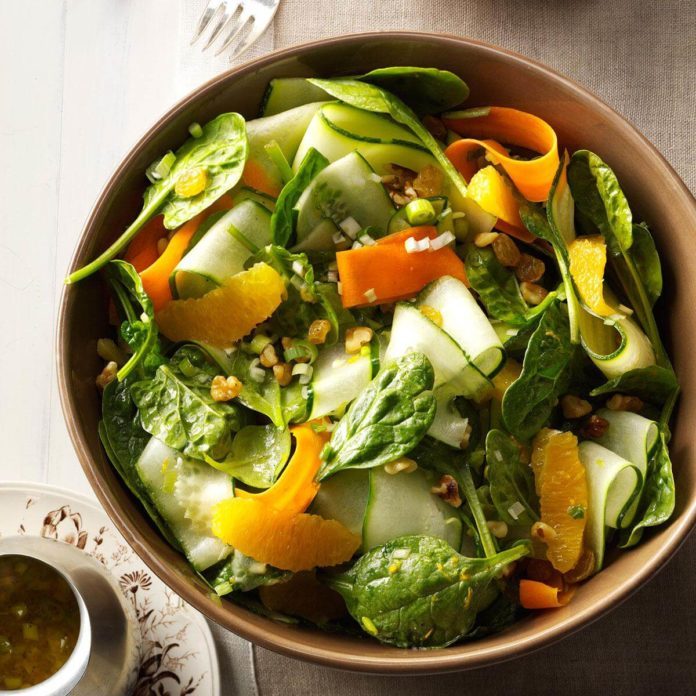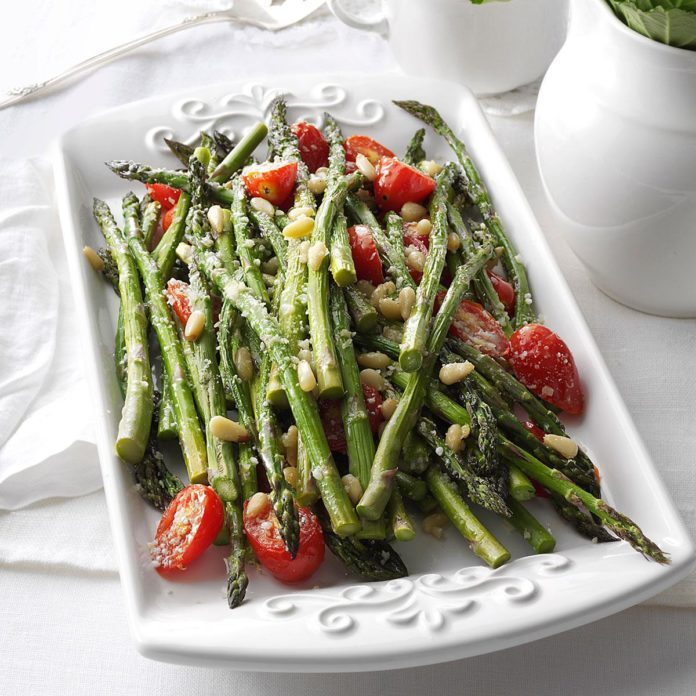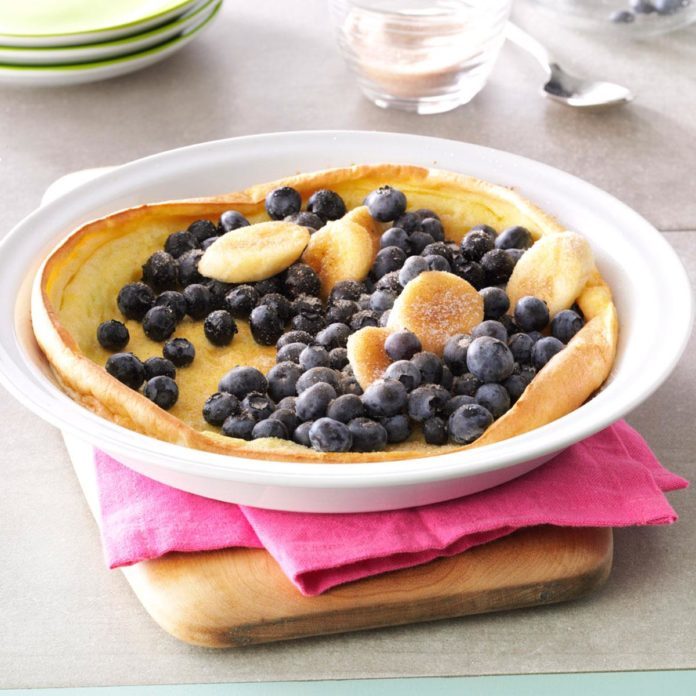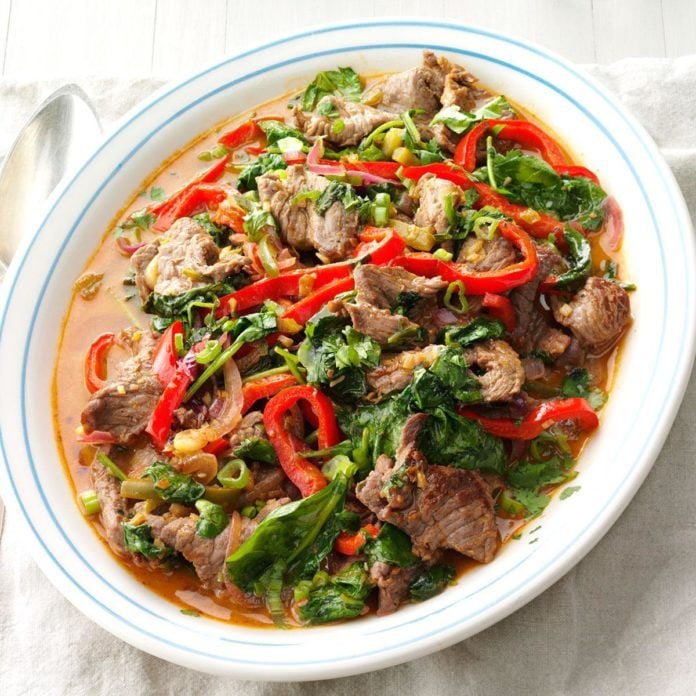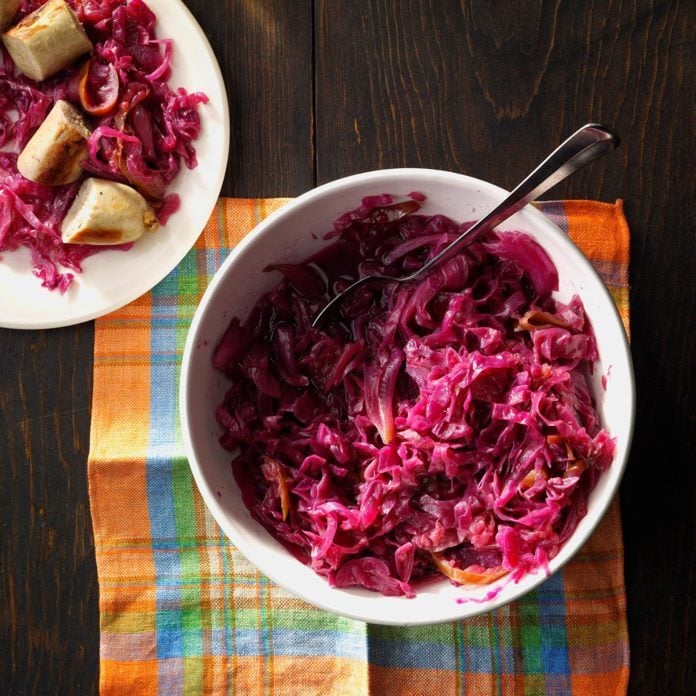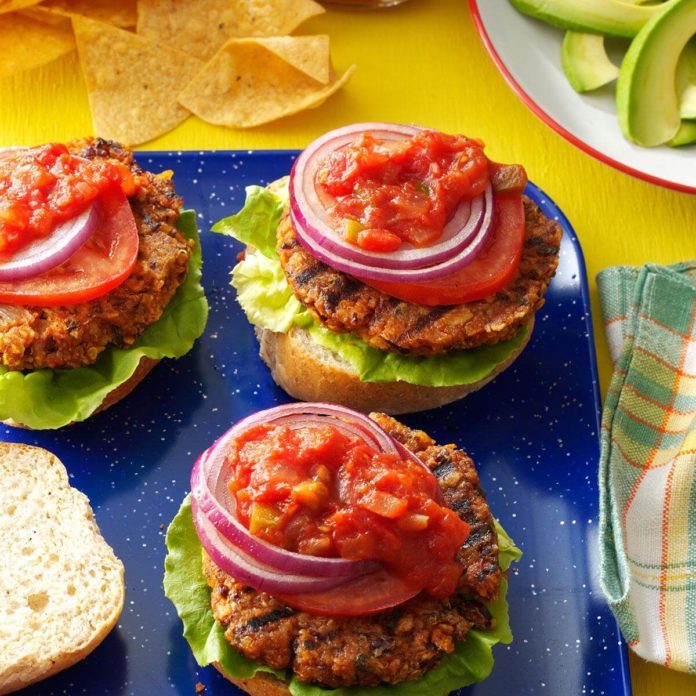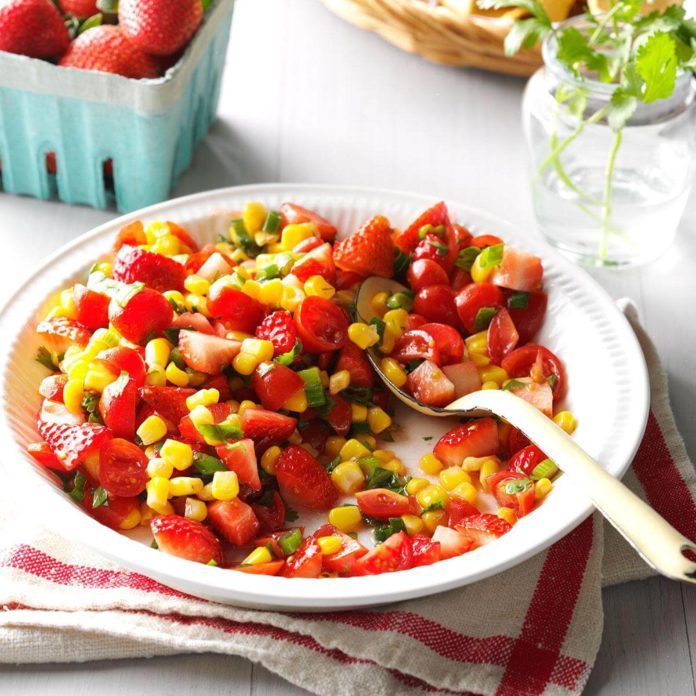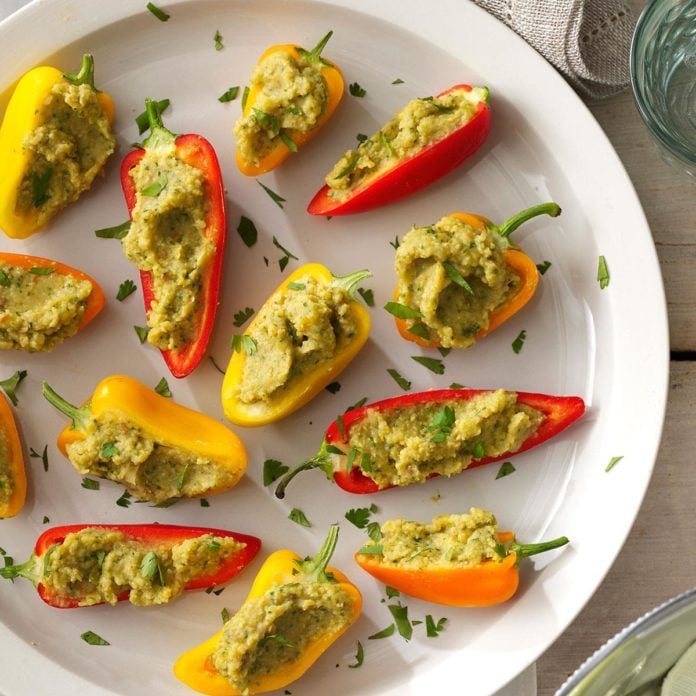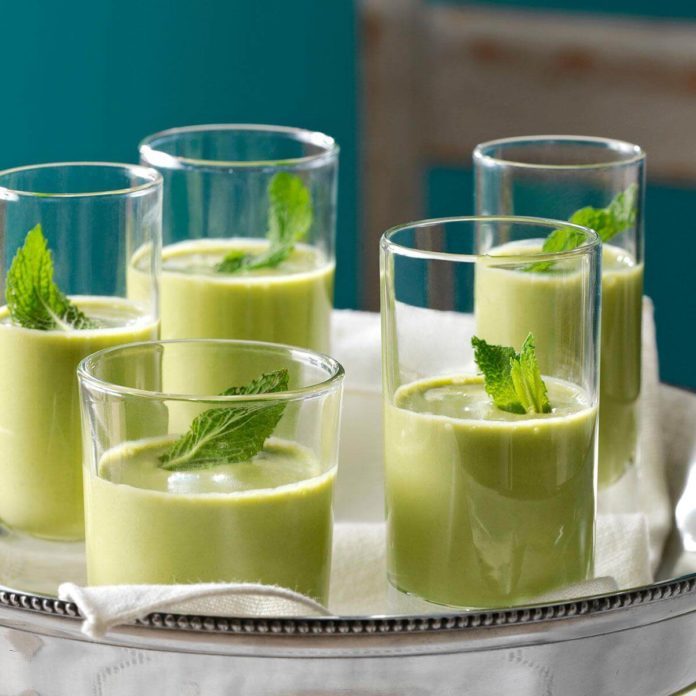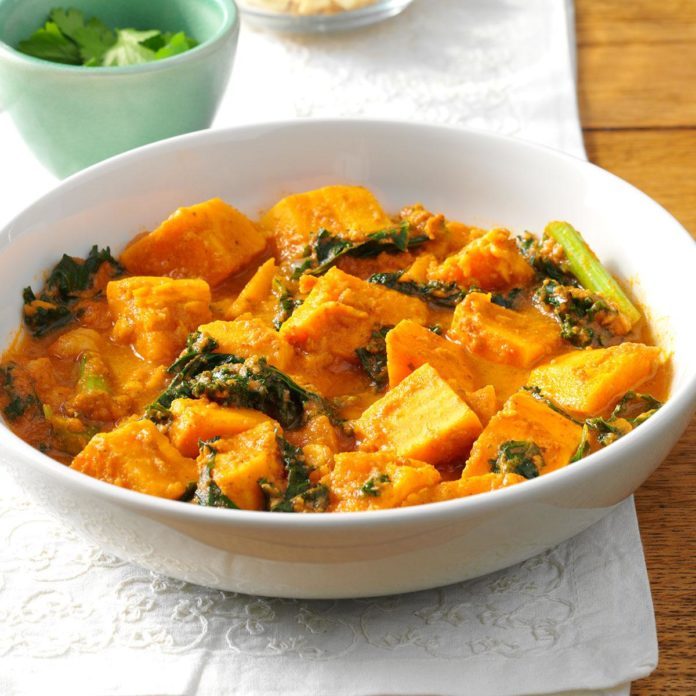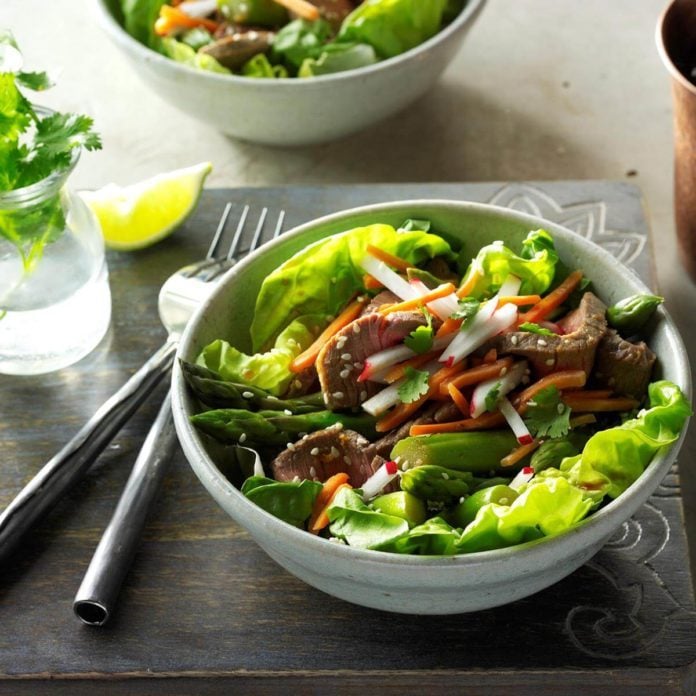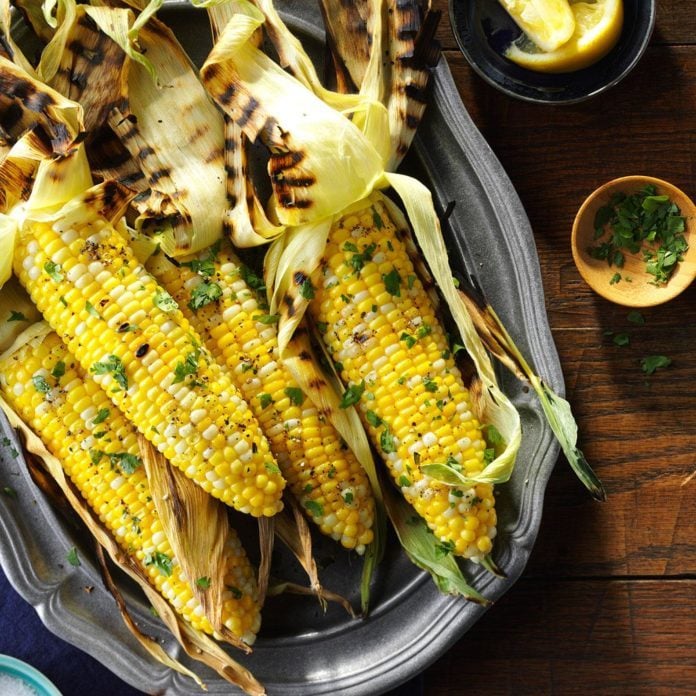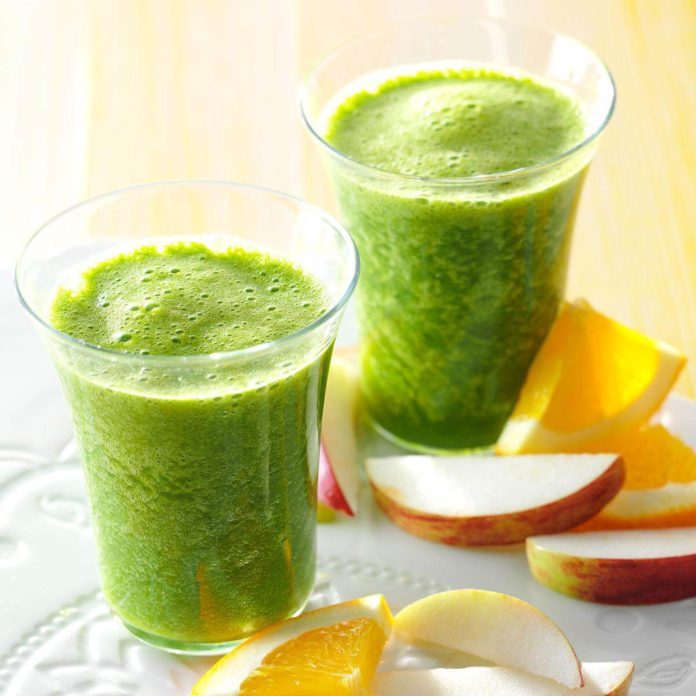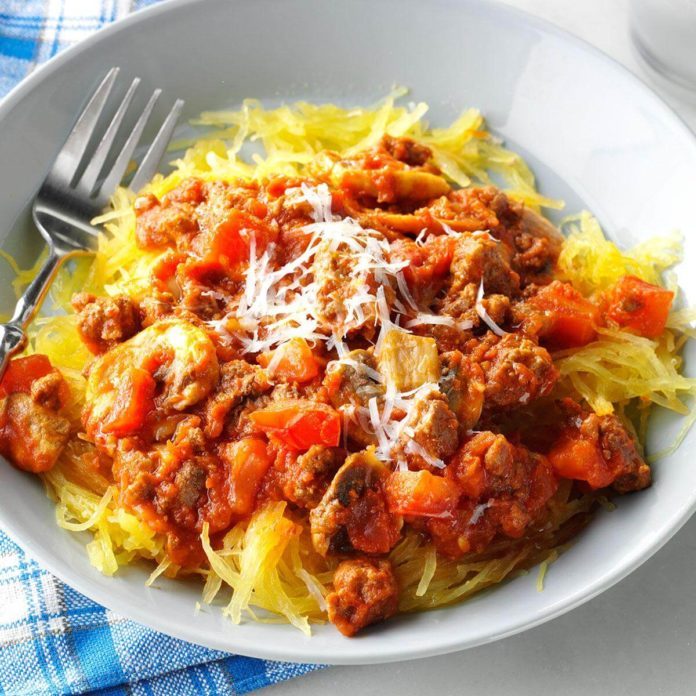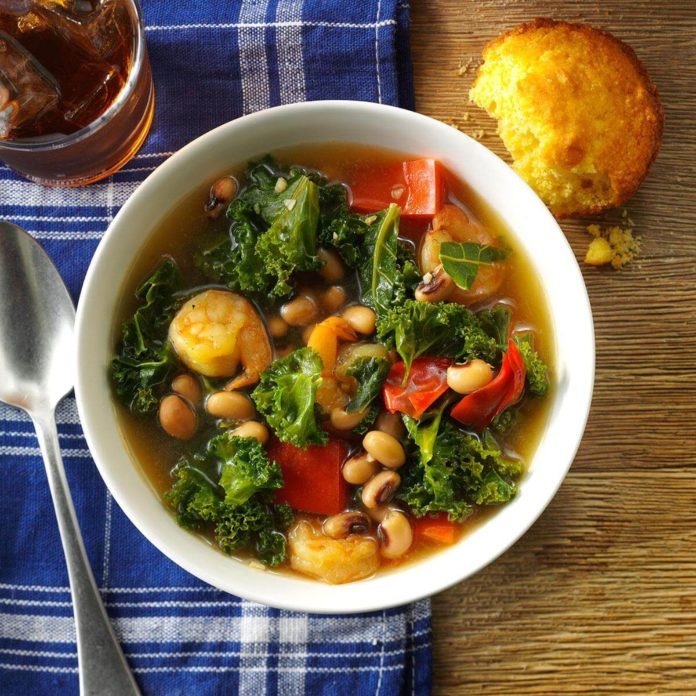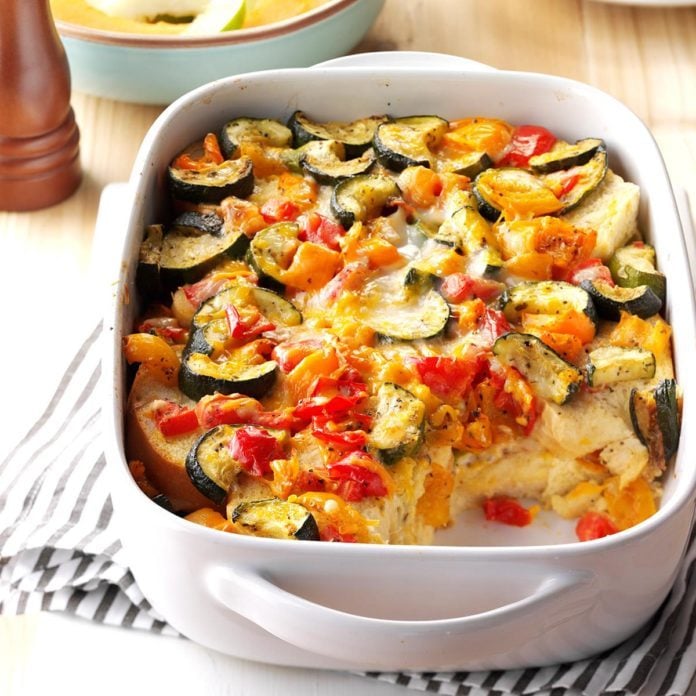Tomatoes are the reason I have a vegetable garden, and I developed this recipe as a way to show off my plum, sun-dried and cherry tomatoes. It's so easy, and will absolutely impress. —Rachel Kimbrow, Portland, Oregon
Get Recipe
Zucchini, cucumbers and carrots are peeled into “ribbons” for this citrusy salad. We like to serve it for parties and special occasions. —Nancy Heishman, Las Vegas, Nevada
Get Recipe
This is especially wonderful when locally grown asparagus is in season and so easy for celebrations because you can serve it hot or cold. This is how to bake asparagus. —Jannine Fisk, Malden, Massachusetts
Get Recipe
Salmon and basil take a sweet new approach when topped off with a relish of strawberries, honey and pepper. —Stacy Mullens, Gresham, Oregon
Get Recipe
This recipe combines delicious whole wheat pasta with the best of fresh garden produce. It's tossed with heart-healthy olive oil, and a little feta cheese gives it bite. —Angela Spengler, Tampa, Florida
Get Recipe
This fruity puff pancake is a top breakfast request at my house. The combination of cinnamon, blueberries and bananas is wonderful. —LeAnne Senger, Oregon City, Oregon
Get Recipe
A few people in my family have special dietary needs, but luckily, these chicken tacos work for all of us. I toss up a simple green salad and have a meal we can all enjoy together. —Christine Schenher, Exeter, California
Get Recipe
Carrots make a super side—big on flavor and a breeze to cook. Plus, I can actually get my husband to eat these fragrant, deeply spiced veggies. —Taylor Kiser, Brandon, Florida
Get Recipe
Rice vinegar, sesame oil and cayenne create a sweet-hot Asian flavor that will light up your taste buds! —Alivia Dockery, Jensen Beach, Florida
Get Recipe
When you're short on time and scrambling to get a meal on the table, this recipe is "eggs-actly" what you need. There's a short ingredient list, and cooking is kept to a minimum. Plus, with green pepper and tomato, it's colorful. —Taste of Home Test Kitchen
Get Recipe
I've always had to be creative when getting my family to eat vegetables, so I decided to make stuffed zucchini using the pizza flavors that everyone loves. It worked! We like to include sausage for a main dish but it could be a meatless side dish, too. —Donna Marie Ryan, Topsfield, Massachusetts
Get Recipe
I still think there's no better combo than sweet potatoes with pork, or prosciutto in this case. I'm a retired physician and am glad that sweet potatoes are being given their due as nutritional powerhouses. —Helen Conwell, Portland, Oregon
Get Recipe
Think of this stir-fry as your chance to play with heat and spice. I balance the beef with coconut milk and a spritz of lime. —Joy Zacharia, Clearwater, Florida
Get Recipe
When cooler weather comes, soup is one of our favorite meals. I developed this recipe for my husband and me. I wanted it to be a healthier version of all the cream-based soups out there. After a bit of trial and error, this is the keeper. —Elizabeth Bramkamp, Gig Harbor, Washington
Get Recipe
For a cool salad on a hot summer day, I combine shrimp, corn, tomatoes and nectarines with a drizzle of tarragon dressing. We love it chilled, but it's delectable served right away, too. —Mary Ann Lee, Clifton Park, New York
Get Recipe
I've been making this low-fat ham dinner for my family for years, and we always look forward to it. With asparagus, tomato, pasta and chunks of ham, it's a tempting blend of tastes and textures. —Rhonda Zavodny, David City, Nebraska
Get Recipe
For a fruit salad that’s delightful, we combine berries and citrus with a honey-lime dressing flecked with poppy seeds. —Carrie Howell, Lehi, Utah
Get Recipe
I love to share my cooking, and this hearty meal-in-one has gotten a savory reputation around town. People have actually approached me in public to ask for the recipe. —Laurie Sledge, Brandon, Mississippi
Get Recipe
Sunday afternoons were a time for family gatherings when I was a kid. While the uncles played cards, the aunts made treats such as this traditional German red cabbage recipe. —Jeannette Heim, Dunlap, Tennessee
Get Recipe
I finally invented a healthy quinoa burger that wasn't dry and crumbly or really boring. These fit the bill—even my grandkids prefer them over hamburgers. They taste like chips and dip in a burger! —KT Rehrig, Allentown, Pennsylvania
Get Recipe
My daughter got this recipe from a college friend and shared it with me. Now I serve it often as an appetizer. It certainly is the talk of the party. —Lorna Sirtoli, Cortland, New York
Get Recipe
My black-eyed pea salad reminds me of a southern cooking class my husband and I took while visiting Savannah, Georgia. People go nuts for it at picnics and potlucks. —Danielle Lee, Sewickley, Pennsylvania
Get Recipe
I always like to bring this to parties and potlucks, and people seem to really appreciate having a healthy option. No oil is necessary for this salad; the lemon juice combines with the feta to lightly coat the bright, fresh ingredients. —Camille Parker, Chicago, Illinois
Get Recipe
Whip up this creamy concoction as a refreshing and nutritious snack or a quick chilled breakfast. Because you can use frozen fruit, you don't have to wait until peaches are in season to enjoy this delicious smoothie. —Martha Polasek, Markham, Texas
Get Recipe
This recipe makes art in a bowl! All the colors of summer are captured in this salsa with a fresh, light flavor perfect for snacking between swims or to kick off a backyard barbecue. This can be served with chips or alone as a side dish. —Catherine Goza, Charlotte, North Carolina
Get Recipe
This is a simple yet elegant dish that always pleases my guests. Not only is it tasty, but it is healthy, too. The more varied the colors of the tomatoes you choose, the prettier the salad will be. —Jess Apfe, Berkeley, California
Get Recipe
I've liked the chicken and artichoke combo for a long time. Here's my own lemony twist. With all the praise it gets, this dinner is so much fun to serve. —Carly Giles, Hoquiam, Washington
Get Recipe
My garden is often my cooking inspiration. Because I have a large berry patch, I especially enjoy using just-picked berries in savory dishes to add natural sweetness and sometimes a bit of tart. —Roxanne Chan, Albany, California
Get Recipe
My grandma Dot used to make rhubarb compote and always had some in the freezer when I came to visit. This breakfast is a tribute to her. No two stalks of rhubarb are exactly alike, so make sure to taste your compote before you chill it. It should be tart, but sometimes needs a little extra sugar. —Michael Hoffman, Brooklyn, New York
Get Recipe
Mini peppers are so colorful and they're the perfect size for a two-bite appetizer. They have all the crunch of a pita chip, without the extra calories. —Christine Hanover, Lewiston, California
Get Recipe
Appetizers really don’t get any easier than this. Plus, these shooters can be made ahead, they’re colorful, and won’t weigh you down. Top with a small dollop of yogurt for a little more tang. —Jacyn Siebert, San Francisco, California
Get Recipe
I discovered this fragrant salad in a cooking class. If you can, try to find orange flower water (also called orange blossom water), which perks up the orange segments. But orange juice adds a nice zip, too! —Carol Richardson Marty, Lynwood, Washington
Get Recipe
I love making this stuffed pepper recipe. It's one of the few ways I can get my husband to eat veggies. Make it meatless by replacing the beef with eggplant and adding more vegetables like mushrooms or squash. You can also replace the rice with barley, couscous or even orzo. —Jennifer Zimmerman, Avondale, Arizona
Get Recipe
Back when I was in college, my mom made an addicting sweet potato and peanut stew. I shared it with friends, and now all of us serve it to our own kids. They all love it, of course. —Alexis Scatchell, Niles, Illinois
Get Recipe
We love to eat turkey, and on hot summer days, here's how we get our fix. For golden-brown turkey, broil for a few minutes before serving. —Margaret Bracher, Robertsdale, Alabama
Get Recipe
This addictive vegetable combo is a fresh take on one of my mother's standard wintertime dishes. I usually add more carrots—as many as the pans will hold. —Lily Julow, Lawrenceville, Georgia
Get Recipe
Who can tell that this delicious smoothie is made with tofu? No one (especially your kids)! The blend of berries and pomegranate juice makes this welcoming drink a refreshing delight. —Sonya Labbe, West Hollywood, California
Get Recipe
Tossing the cooked potatoes with stock and wine right after you drain them infuses them with flavor. The liquid absorbs like magic. —George Levinthal, Goleta, California
Get Recipe
I’m always looking for ways to serve my family healthy and delicious food, so I started experimenting with my favorite veggies and ground beef. I came up with this favorite that my three kids actually request! This healthy take on sloppy joes reminds me of my own childhood. —Megan Niebuhr, Yakima Washington
Get Recipe
Let's face it, everything really is better with bacon. I fry it up, add cod fillets to the pan and finish with a big, tomato-y pop. —Maureen McClanahan, St. Louis, Missouri
Get Recipe
Cooking is one of my favorite hobbies—especially when it comes to experimenting with fresh ingredients like these. This meaty salad is wonderful at the start of asparagus season. —Tamara Steeb, Issaquah, Washington
Get Recipe
Start this breakfast the night before so you can get a few extra z's in the morning. My husband adds coconut to his, and I stir in dried fruit. —June Thomas, Chesterton, Indiana
Get Recipe
This salad makes it easy to eat what’s good for you. It’s versatile, so you can use asparagus in place of green beans and salmon instead of tuna, or add garden tomatoes. And if you follow the keto diet, you'll be happy to know this is a keto chicken salad. —Nick Monfre, Oak Ridge, New Jersey
Get Recipe
I always end up with lots of rhubarb each summer, but many of the recipes use a lot of sugar. This one lets the fruit sweeten up the rhubarb instead. I refrigerate the sauce overnight to help the flavors blend. —Amy Nelson, Weston, Wisconsin
Get Recipe
Corn on the cob is a comforting and cherished Midwest dish. It's amazing when grilled, and my recipe adds a few unexpected ingredients to make it taste even more like summertime. —Caitlin Dawson, Monroe, Ohio
Get Recipe
Oven-roasting root vegetables is a delicious way to get the most out of these earthy treats, bringing out their subtle sweetness. Serving them over endive with a homemade vinaigrette is just a bonus! —Peter Halferty, Corpus Christi, Texas
Get Recipe
Since I started making this green smoothie recipe for breakfast every day, I honestly feel better! Substitute any fruit and juice you like to make this recipe your own healthy blend.—Linda Green, Kilauea, Kauai, Hawaii
Get Recipe
Get ready to experience another side of stone fruits. Hot off the grill, this late-summer dessert practically melts in your mouth. —Sonya Labbe, West Hollywood, California
Get Recipe
I came up with this amazing recipe when I had a load of cherries on hand. My family polished them off fast, and asked for more. Luckily I had enough fruit to make them again the next day! —Melissa Barlow, Fruit Heights, Utah
Get Recipe
I used to avoid sweet potatoes as a child, mostly because they came out of a can. When I heard of the many health benefits, I began trying fresh sweet potatoes with my husband. We like to make fries with different toppings like cinnamon sugar or cayenne pepper, and then we discovered how awesome they are with blue cheese. —Katrina Krumm, Apple Valley, Minnesota
Get Recipe
My four year old twin grandchildren love to cook and create in the kitchen with me. Last summer, the three of us were experimenting with watermelon and cheese and that's where this recipe began. It's ideal for neighborhood gatherings and picnics, or as a healthy snack on a hot summer day. —Gwendolyn Vetter, Rogers, Minnesota
Get Recipe
At our house, we love the summer tastes of sweet grilled nectarines and fresh basil over goat cheese. I can usually find all the ingredients at the farmers market. —Brandy Hollingshead, Grass Valley, California
Get Recipe
Just looking at this bright red salad cheers me up—and then I get to taste it! For garnish, sprinkle on fresh chives and mild white cheese. —Lorraine Caland, Shuniah, Ontario
Get Recipe
We have a large asparagus patch and are able to freeze a lot for the year. This recipe highlights all the flavor of the vegetable and is very easy to make. I like to heat some soup up in a coffee mug for an afternoon snack! —Sherri Melotik, Oak Creek, Wisconsin
Get Recipe
I have reduced grains and other starches in my diet due to health reasons, so I was looking for filling, comforting meals without pasta or potatoes. When I was tinkering with this recipe, I discovered that spaghetti squash is fun to experiment with as well as eat. —Becky Ruff, Mc Gregor, Iowa
Get Recipe
I needed a change from the standard guacamole recipe, so I added mango for more sweetness. It really complements the heat from the chili pepper, and it looks beautiful, too! —Adam Landau, Englewood Cliffs, New Jersey
Get Recipe
I have eggs every morning, and this is a great change from the classic scrambled egg meal. I like to add sliced peppers on top if I have them on hand.—Valerie Belley, St. Louis, Missouri
Get Recipe
I came up with this easy salad while brainstorming light, protein-filled recipes. My vegetarian and vegan friends are especially big fans. —Maiah Miller, Monterey, California
Get Recipe
Fresh shrimp from the Carolina coast is one of our favorite foods. We add kale, garlic, red peppers and black-eyed peas to complete this wholesome, filling soup. —Mary Marlowe Leverette, Columbia, South Carolina
Get Recipe
A sweet-tart cranberry salsa is the ideal accompaniment to leftover turkey in this breezy quesadilla. With a hint of lemon and pear, the salsa is also good with chicken or pork. —Jodi Kristensen, Macomb, Michigan
Get Recipe
With the abundance of zucchini my family has in the fall, this is the perfect dish to use what we have. Cheesy and rich, this is a warm, classic breakfast dish sure to please! —Colleen Doucette, Truro, Nova Scotia
Get Recipe
I jazz up guacamole by serving it atop endive leaves. Add a brilliant red pepper salsa, and you’ve got a standout appetizer. —Gilda Lester, Millsboro, Delaware
Get Recipe

